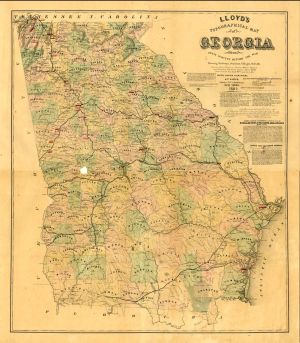 The citizens of middle Georgia yet live far from any battlefield action, despite Union encroachments as far south as the state’s coastal islands and, since the fall of 1863, Chattanooga, Tennessee. Accordingly, the town of Macon, the region’s largest city, in recent months has become a hub of hospitalized Confederate soldiers, their numbers growing daily. Although absent the sounds of the battlefield, the presence of so many wounded warriors in Macon ensures that the war is an ever-present reality.
The citizens of middle Georgia yet live far from any battlefield action, despite Union encroachments as far south as the state’s coastal islands and, since the fall of 1863, Chattanooga, Tennessee. Accordingly, the town of Macon, the region’s largest city, in recent months has become a hub of hospitalized Confederate soldiers, their numbers growing daily. Although absent the sounds of the battlefield, the presence of so many wounded warriors in Macon ensures that the war is an ever-present reality.
Thus far, church life in middle Georgia goes on as normal–that is, if normal includes the absence of many if not most male congregational members, ministry among the hospitalized soldiers, and, in Macon, a growing trickle of refugees seeking to escape the ravages of war.
Normalcy is found in certain patterns of church life that have been stable for decades. Many churches in outlying rural areas do not meet this month, due to the travel restraints of cold weather. Other churches meet, and in several instances elect a new preacher for the year; in many smaller Baptist congregations of the South, preachers are elected annually, often chosen from within the congregation.
Of the congregations that do meet this month, the collective monthly business sessions encompass a variety of matters, some more interesting than others.
The Bethel Baptist Church of Jasper County forms a committee to investigate a problem that, if true, merits disciplinary action: reports are that “certain members” have been seen “dancing.” For Baptists of the South, dancing is a serious sin, an activity inconsistent with good moral, Christian character.
The Bethesda Baptist Church of Green County also focuses on church discipline, forming a committee to investigate “evil reports in circulation” concerning a member named Hardy.
In Baptist congregations, discipline committees formed to investigate charges of sin against a member typically take three months or longer to reach a conclusion. During the course of an investigation, the accused is allowed to address the charges and, if found guilty, is encouraged to express remorse and ask for forgiveness. When forgiveness is requested, the guilty individual is often forgiven by the church and life goes on. In some instances, however, a sinner does not seek forgiveness, contrition is deemed insufficient, or the evidence is so overwhelming that the offender is excommunicated from the church.
In the case of the Bethel Baptist Church, the issue of dancing has been an ongoing problem. Without divulging specifics as to why, church members in February 1863 had a discussion about the propriety of members dancing within their own homes. The next month, members had reached the conclusion, as had many other Baptist churches beforehand, that dancing is “evil and contrary to religion.” Having already made this determination, the committee formed this month does their work quickly. Two months hence, in March, the committee concludes that the report of dancing was false.
On the other hand, the Bethesda committee charged with investigating unnamed “evil reports” takes three months to reach a verdict. In February, a letter is read to the church in which Hardy seemingly admits, albeit vaguely, to having committed a terrible sin. The committee thereafter reaches their conclusion, and in March Hardy is excommunicated from the congregation, apparently having not been sufficiently contrite for having committed the sin of fornication (which is a little worse than the sin of dancing).
Non-discipline church matters are also addressed this month by churches in middle Georgia. With the war on their minds, members of the Madison Baptist Church of Morgan County vote to take a collection to support an Army missionary. In the absence of male members in the pews, the church also votes to start a young lady’s class.
The Union Baptist Church of Spalding County receives a “letter from the army.” While read before the congregation, church minutes are typically vague and the letter writer and nature of the missive are not noted.
Meanwhile, the Poplar Springs North Baptist Church of Laurens County revisits what is an annual procedure in many Baptist congregations: the choosing of a member to furnish wine for communion services for the year. A deacon is so appointed.
Poplar Springs represents most Baptist churches of the South at this point in allowing alcohol consumption (and utilizing real wine in communion), but disciplining drunkenness. A tide against tolerance of alcohol, however, is washing ashore in the life of Baptist churches of the South, pushed along by problems of drunkenness among Confederate soldiers and too many instances of farmers selling their corn for use as whiskey, rather than food, in these hard times. The tidal wave of the prohibition movement will not hit until around the turn of the 20th century, but the campaign against alcohol is slowly gaining momentum.
For now, however, Poplar Springs Baptist members continue to enjoy wine in their communion services
Sources: Minutes, Bethel Baptist Church (Jasper County), Bethesda Baptist Church (Greene County), Union Baptist Church (Spalding County), Poplar Springs North Baptist Church (Laurens County), Special Collections, Mercer University Jack Tarver Library; also see Bruce T. Gourley, Diverging Loyalties: Baptists in Middle Georgia During the Civil War, Macon, Ga.: Mercer University Press, 2011 (link)


